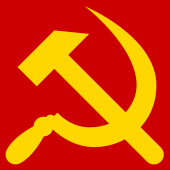strijder20
Wallowing in irony
Some ideas can be "extracted" from communism and mixed with / incorporated into capitalist and democratic societies, to improve them..
Yes, economic planning really became popular in capitalist societies because of the success it had in the U.S.S.R.
"Pure communism" is maybe actually not such a bad idea, but is impossible to implement in developed societies (maybe you can try with hunter-gatherers!).
Impossible is such a harsh word, but I agree with you that communism doesn't seem to establish itself easily.





